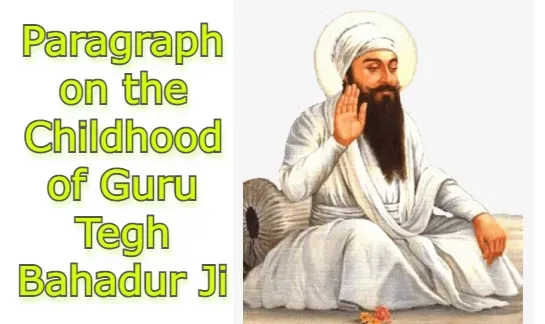Paragraph on the Childhood of Guru Tegh Bahadur Ji
"Let's salute the sacrifices made by our Guru Tegh Bahadur js on his birth anniversary"
Introduction:-
India is the birthplace of various great human beings. Gurutegh Bahadur is one of them. Guru Tegh Bahadur is a poet, thinker and warrior who furthered the authority of the sanctity and divinity of Guru Nanak Dev and subsequent Sikh Gurus.
He was the ninth Sikh Guru who sacrificed himself for the freedom of religion. He was revered by the Sikhs as the 'Savior of Humanity' (Shrishta-di-Chadar).
Birth of Guru Tegh Bahadur Ji
Guru Tegh Bahadur was the youngest son of Guru Hargobind Sahib. He was born in Amritsar in April 1621. His mother was Bibi Nanki ji. His birth name was Tyag Mal, but in view of his courage and bravery, he was named Tegh Bahadur. Following in the footsteps of Guru Har Krishna, he became Gusiu on 16 April 1664.
"Never leave the ones you vow to save but leave your head. Sacrifice your life but never your faith"
Essay on Guru Tegh Bahadur Ji's Childhood
Guru Tegh Bahadur's childhood name was Tyag Mal. His childhood was spent in Amritsar. Tayag Mal had learned Gurmukhi, Hindi, Sanskrit and Indian religious philosophy from Bhai Gurdas as a child and archery, horse riding from Baba Buddha, while his father taught him fencing.
From a young age, he was trained in the martial arts of archery and horse riding. He grew up to be a brave young man and displayed courage in battles against the Mughals which often involved Sikhs.
At the age of only 13, he asked his father to accompany him in the war as his village was attacked by Pandey Khan and the Mughals in a battle at Shah's eagle.
After winning the battle, the victorious Sikhs who entered the house honoured their new hero with the name of a new warrior and hence the name of Tyaag Mad Ji was changed to Tegh Bahadur Ji.
The young Tegh Bahadur soon showed an inclination towards the first Sikh guru, who had crossed Nanak's 'seli' to reach the new guru.
He was engrossed in his studies and spent his time meditating according to his given name, Master of Renaissance. He was married to Mata Gauri in 1632 in Kartarpur.
Achievements of Grosu Tegh Bahadur Ji
Guru Tegh Bahadur was also a versatile and poet and gave the message of freedom, courage and compassion. "Fear not and not be free? During the last period of Guruji's life, he founded a new city called Anand Bur Sahib and went on missionary tours. But went and Bengal.
He was a symbol of the victory of good over evil, Guru ji's martyrdom, unparalleled in the history of mankind, inspired many Sikhs to sacrifice their lives for noble deeds and moral values.
Conclusion:
He says that in today's time such a lesson becomes even more important. We see people bragging about themselves on extremely unimportant matters and more importantly. Today religious freedom has narrowed even further and this is perhaps the best time to remember Guru Tegh Bahadur Ji.
"The Material world is perishable and illusion This truth only down on person during suffering"
Essay on the childhood of Guru Tegh Bahadur Ji
Our society has always been in need of such great men, whose sacrifices inspire us to lay down our lives but do not give up on the truth. One of the great sacrifices of these great men was "Guru Tegh Bahadur ji" He is a shining milestone in the history of our land
Guru Tegh Bahadur was born on 1 April 1621 in Amritsar, Punjab. Born to the ninth Guru, Guru Hargobind, and his wife Mata Nanak, Tyag Mal learned Sanskrit, Hindi and Gurmukhi from the revered Sikh scholar Bhai Gurdas. While Baba Buddha taught him horse riding and archery, Guru Hargobind taught him fencing.
When Tyagamal was just 13 years old, he completed his father's fight against the Mughals, who laid siege to Kartarpur, successfully defended by the Sikhs. For displaying great valor and military prowess in battle, Guru Hargobind bestowed the title of "Tegh Bahadur" on his son.
Thyaga Mal, which literally means "the wielder of the brave sword", henceforth came to be known as Tegh Bahadur. Hargobind sahib ji loved Guru Tegh Bahadur very much.
People always used to say "He (Tegh Bahadur) has come with a divine identity since birth. Guru Hargobind knew that Tegh Bahadur would be very brave and benevolent, so he did everything necessary for him."
Emphasis on training. For literacy (various education) he was handed over to Bhai Gurudas ji. After this, he was sent to Baba Buddha ji to learn the importance of labour and other virtues.
Apart from this, Tegh Bahadur ji also studied Gurbani very deeply, Guru Hargobind ji used to tell his child that one day our son would definitely be rich in running Tegh and when he grew up he did the same, both devotion and power. Be together Him.
Guru Tegh Bahadur Singh sacrificed everything to protect religion and religious freedom and was called "Hind ki Chadar".
Some writers have said that "Once you have promised allegiance to someone, sacrifice your head, but don't let him down on any shore". but did not waver from his faith.
THANK YOU SO MUCH

Comments
Post a Comment